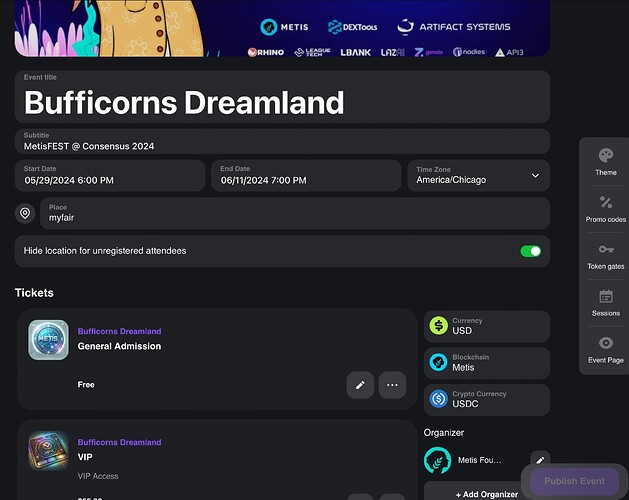Introduction Value
Blocklive is a platform for end-to-end onchain event management and ticketing. We embrace proof of history as a way for organizers to target and reward fans. We want to create the most powerful decentralized graph of real world human interaction.
Value Proposition
On-chain tickets, as facilitated by Blocklive, unlock capabilities far beyond the reach of traditional web2 platforms. They provide a permissionless, immutable record of a user’s engagement with events, creating a digital footprint of their real-world interactions. This not only enriches the user’s experience within our platform but also opens up expansive possibilities for engagement and personalization beyond it. Imagine a world where attending an event leaves a mark that could later tailor experiences, offers, and interactions in entirely new ways.
This transformation extends to artists and event organizers as well, who can leverage this data to forge deeper connections and understandings with their communities. The granularity and authenticity of onchain attendance records promise to redefine how relationships between creators and their audiences are built.
Blocklive’s approach turns each ticket into a composable building block for the broader ecosystem. Without needing direct coordination, a merchandise vendor could verify event attendance to offer exclusive products, or a game developer could reward players based on their real-world engagement. This seamless interoperability, powered by onchain data, paves the way for new ways to integrate between applications, setting a new standard for how we interact with the real and digital worlds.
Blocklive isn’t just introducing a new way to ticket events - it’s unlocking a paradigm shift in how we record, interact with, and derive value from our real-world experiences through the power of blockchain.
Uniqueness Factor
Despite numerous attempts to revolutionize on-chain ticketing, success has remained elusive—until now. Blocklive stands apart by achieving what others couldn’t: merging the high-quality experience event organizers and attendees demand with the innovative use of blockchain for ticketing. This combination has long been sought in the blockchain community but has yet to be realized, until Blocklive.
Blocklive is the only platform that allows event attendees to RSVP or purchase tickets with a frictionless web2 flow, while behind the scenes, creating wallets and executing onchain transactions to airdrop tickets to users. We get the best of web2 and web3 and a mechanism to onboard millions of event attendees onchian.
Benefits for Users
Blocklive revolutionizes the event experience for two primary stakeholders: the attendees and the organizers.
Attendees of conventional ticketing services like Ticketmaster or Eventbrite experience events as fleeting moments. Once the event concludes, the only remnants are receipts or QR codes buried in email inboxes. Blocklive transforms these ephemeral tokens into lasting digital assets, converting what was once a simple email receipt into a permanent, brag-worthy record on the blockchain. More significant than the prestige of collecting these records is the opportunity for attendees to earn rewards based on their participation. This system enables access to future benefits and experiences that were previously inaccessible, enriching the event-going journey beyond the physical attendance of events.
For event organizers, the traditional toolkit for audience engagement has been decidedly narrow, often limited to generic email communications to past event attendees. Blocklive’s on-chain capabilities revolutionize this dynamic, introducing the concept of on-chain retargeting. This allows organizers to recognize and reward attendees based on their verified, blockchain-stored event histories. Such granularity in targeting and rewarding offers a new depth to the organizer-attendee relationship, enabling personalized and meaningful connections that extend far beyond the event itself.
Benefits for Metis Ecosystem
The Metis ecosystem benefits through a new composable building block that is now accessible to all users and builders. Users will now have a record on Metis of their event attendance. Each event is a deployed contract onto Metis. Each attendee is a new wallet and on chain transaction with a ticket either minted directly or airdropped into the user’s wallet. This brings more volume and value directly to the Metis chain. It also offers an opportunity to price tickets in METIS or other ERC20 tokens on Metis, meaning users need to bridge more assets onto the chain. They also may lock more liquidity to make it convenient to access future events.
Summary
Overall, it is inevitable that much of the web2 world moves onchain. We hope to lead the charge for bringing live entertainment onchain and onto Metis. The specific value Blocklive brings to Metis lies in its ability to transform event attendance into a verifiable, on-chain record. This integration enhances user engagement by making each event participation a part of the user’s digital identity on the blockchain. By deploying events as smart contracts on Metis, we’re not just increasing the blockchain’s transaction volume; we’re also diversifying its use cases and proving its capacity to support complex, real-world applications.
Official Links: Website, Docs, Audits, etc.
Blocklive homepage: https://blocklive.io/
Twitter: https://twitter.com/blocklive_
Warpcast: Warpcast
Blog: Blocklive
Docs: What is Blocklive? | Blocklive
